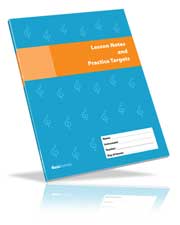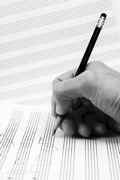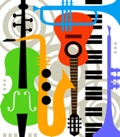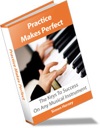Creative solutions
to all of your practice problems
Welcome to Issue 4 of the Perfect Practice Monthly E-zine. The only E-zine available that helps you make more progress in less time on any instrument! As you read through the e-zine and pick up new ideas think about how you will apply them to your practice, then you just apply them to your practice one at a time. Hey presto! Instant progress!
If you have a friend or student who would also benefit from improving the effectiveness of their practice, please do them (and me) a big favor and forward this to them.
If a friend DID forward this to you and you like what you read, please subscribe. Just click here to subscribe
In this issue...
1) Lesson Notes and Practice Targets book now available - Get more from your lesson and your practice with this teacher-student notebook.
2)The importance of theory - A knowledge of music theory can be just as important as having good instrumental and practice technique!
3)New areas coming soon to Essential Music Practice site I am currently working with some other top musicians and teachers to bring new instrument specific sections to the site 4)Practice tip of the month - There is no failure, only feedback - Top practice tips from successful people inside and outside the music industry. Find out how to apply the strategies that took these people to the top of their field.
5)Software tip - There is a huge amount of music software available but none of it is really dedicated to practice. Read this section for advice on how to use different programs to improve your practice effectiveness. This month I am continuing my testing of software which claims to teach you perfect pitch.
News
1)Lesson Notes and Practice Targets now available

As an instrumental teacher it has long been my belief that the way in which teachers write student notes has a profound effect on the quality of practice and, therefore on the quality of their playing in the next lesson and their overall progress in general.
I found that if I divided the notes on student's playing during a lesson and the targets I expected them to achieve the following week, the students found it much easier to plan their practice throughout the week. When asking them about why this was the case they told me it is quicker and easier as they can see the targets clearly without having to read through the notes on the last lesson to find what needs to be done. Additionally, once a practice plan is made it is quick and easy to refer to the comments on each piece when practising.
I created the Lesson Notes and Practice Targets sheet to use in my lessons, which is also available for download on the Essential Music Practice website. Click here to download an example of the Lesson Notes and Practice Targets sheet". After making this available on the website last year and having over 3000 teachers and students download it, many teachers contacted me and asked about putting the sheets together into a book format to make it easier to keep notes and records together. Lesson Notes and Practice Targets is the result!
Lesson Notes and Practice Targets is available directly from Lulu and comes as a 36 lesson book suitable for a year of lessons or a 12 week book suitable for a term. If you are ordering over 50 copies and need a different number of weeks this may be possible. Please contact me for a quote. Any orders over 25 copies have the option of having a school or studio logo added to the cover free of charge. Please contact me before ordering.
The book is Crown Quarto size (7.44 x 9.68in) so has plenty of space for notes and targets. With a clear, easy to use layout Lesson Notes and Practice Targets is the best way to get more from music lessons. Based on the lesson notes and practice planning charts from the Essential Music Practice site it contains clear sections for teacher's notes, targets for the week, student planning and self evaluation as well as goal setting questions, practice tips and a table for planing practice by event. Lesson Notes and Practice Targets teaches all music students how to make better use of their practice time, helping them achieve more progress in less time. Click here for more information on the Lesson Notes and Practice Targets book
2) The importance of theory!

As a young student I have to admit I wasn't that keen on theory...I just couldn't see the point! I wanted to play music, not group notes, write out ornaments, learn Italian terms and compose an 8 bar phrase based on rhythm choice A or B! Looking back, of course, I can see how useful all those skills were and I need to thank my Grandmother for sitting with me and keeping me on task when completing my theory work for my piano teacher...and my piano teacher for making me do it!
Having a good knowledge of theory helps our sight-reading, our composition, our interpretation of music...it means we understand the music instead of just playing the notes. I have even come across students who can't read music after learning an instrument for 2 or 3 years! One person emailed me and asked me if there was any way of reducing the amount of time it took to write the letters over the top of the notes, as it seemed to take a long time before he could begin practising! My response was short...learn to read music!
To help support those who need music theory information in an easily accessible site I am developing the Essential Music Theory website. www.essential-music-theory.com. This site is just starting but I am aiming to build it up over the next couple of months, so check it out if you need an extra theory resource for yourself or your students. I am adding several online theory quizzes to help theory students test themselves after learning information from the site. If you have any comments or anything you would particularly like to see included on the site please contact me on the Essential Music Theory contact page
3)Specific practice techniques for your instrument

Many people have asked if there will be sections on the Essential Music Practice website with practice techniques for specific instruments. The answer is...there wasn't going to be, but since so many people have emailed asking about this I am starting to build those sections! These will be written over the the next few months and the initial pages should start appearing on the site soon.
If you have any specific tips for your instrument you think could benefit others please use this form to contact me and let me know! I will include as many as I can on the site and hopefully we can create a useful resource of specific instrumental practice advice, in addition to the more general techniques on the site.
4)Practice tip of the month - Feedback
This month's tip is based on an NLP supposition - but is very relevant to all music students.
"There is no failure, only feedback"
This is one quote I find very useful with my music students, especially those prone to saying "I can't do that" as soon as they get something wrong once. September is always a time of new beginning students as well and I try to instill this belief in them early to avoid them dropping out a little later when they reach a plateau, or find that first section they just can't seem to get right. I find convincing them they haven't failed if they make a mistake in a concert, or even fail a music exam by a few marks can be quite a challenge.
A few years ago I took a piano student who had just failed Grade 7 by a few marks and was considering giving up due to this failure. The fact he had passed Grades 1, 2, 3 and 5 with distinction and Grade 6 with merit didn't seem to occur to him. All he could see was the failure and the time he had 'wasted' in practising for the exam.
I asked him to spend a week practising one of the Grade 6 pieces he had played a year previously. The following week he performed this piece to me in his lesson and I asked him about his playing of the piece compared to the way he played in his Grade 6 exam. He told me he found it much easier and some of the passages that had given him problems or not been totally secure he now found quite easy. We discussed the time he had spent practising for Grade 7, the techniques he had learned and the fact that failing the exam didn't necessarily mean all the practice time was wasted.
Following this I asked about how he felt on the day, about what he felt went wrong and he told me that he didn't feel great because it was the start of the summer and he had hayfever, although he had taken tablets - which could also have had an effect on him. It transpired he also had IGCSE exams around the same time so had been studying for those and perhaps hadn't done as much practice as he needed to.
These discussions prompted him to think about the timing of future exams, i.e., not in the summer, not near other important school exams and also examine his practice techniques. Using the examiners notes we corrected the problems he had encountered in the pieces and scales, worked hard on his sight-reading and he began to feel confident in, and enjoy his playing again.
We discussed whether to retake the Grade 7 exam, but decided that since he was so close to the pass mark and had learned so much from the experience of 'failing' we would move on, work on technique and repertoire for a few months and look at the Grade 8 pieces.
The concept of 'failure' can be a hard one to accept for students, especially in the current education system where it has become so important for children to succeed at everything, and in some schools where competition is seen as something less than positive. However, knowing how to learn from our mistakes is essential in becoming a good musician. Knowing how to look at our failures, figure out what went wrong and correct it for next time is essential in becoming a good musician. Knowing how to recognise improvement we have made along the way, even when the result in an exam or concert is not the one we hoped for, is essential in becoming a good musician. Use your so-called 'failures' to help make your playing even better.
I have a quote by basketball legend Michael Jordan I like to keep visible in my music room I've missed more than 9,000 shots in my career. I've lost almost 300 games. 26 times I've been trusted to take the game winning shot and missed. I've failed over and over and over again in my life and that is why I succeed.
This is now going to be joined by a quote from Barack Obama, which I believe epitomises what happened to my student: Making your mark on the world is hard. If it were easy, everybody would do it. But it's not. It takes patience, it takes commitment, and it comes with plenty of failure along the way. The real test is not whether you avoid this failure, because you won't. it's whether you let it harden or shame you into inaction, or whether you learn from it; whether you choose to persevere. My piano student decided to persevere. He has recently graduated with a Bachelor's degree in Music with Piano Performance. Make sure you decide to persevere too!
5)Software tip - Perfect pitch
Is it possible to learn perfect pitch using a software package?
Perfect Pitch, also known as absolute pitch (AP) is being able to tell the pitch of a note by hearing it, with no other reference point. The pitch reference is internal. There are several packages available online claiming to teach Perfect Pitch. I am interested in the phenomenon of Perfect Pitch myself - especially since I found out I possessed it from the examiner when I took my Grade 5 piano exam! I had previously assumed that anyone who learned the piano knew how the notes sounded.
I have read many articles on Perfect Pitch and am examining 3 courses which claim to teach perfect pitch at the moment. I will be continuing to analyse these over the next few weeks. I have been trying the lessons out on both my younger and adult students in an effort to find out how easy it is to learn perfect pitch at different points in your life and musical education.
Watch this space for a full report next month!
If you have something to say about practice in general, a tip to help other readers, you want to share a practice related story or you would like to contribute an idea or article to the Perfect Practice newsletter please click here to contact me.
Thanks for reading!
Simon
P.S.I just want to say a huge THANK YOU to everybody who has contacted me about the Essential Music Practice site. Thank you for your kind comments, your stories and for some of the ideas and suggestions on how to make Essential Music Practice an even better resource for musicians and teachers alike.
P.P.S.  Remember my book Practice Makes Perfect is available! Make your music practice more efficient and effective. Easy to read and containing over 140 pages of advice on how to practice, musical goal setting, practice games, exams and further tips on using the music practice charts on this site as well as other invaluable practice advice Practice Makes Perfect is an essential read for all musicians.
Click here for more information on Practice Makes Perfect.
Copyright info
I'm not a big fan of the way copyright laws operate in the world today. I could spend a huge amount of my time surfing the internet looking for people who have copied or translated parts of the Essential Music Practice site or Perfect Practice newsletters...however, I think it would be far more valuable to spend my time researching practice further and getting the information out to other musicians. Therefore, you are free to copy, forward or reproduce the content in this e-zine in any form you wish. I would appreciate an attribution and/or a link back to the Essential Music Practice website - but if you don't I won't come chasing you. I am a great fan of Creative Commons, but this is not under a creative commons license. You are free to use the information in any way whether commercial or non-commercial...if you make a million you can buy me a drink sometime!
New! Comments Have your say about what you've just read! Leave me a comment in the box below.
|



